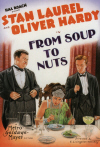|
| |
|
|
FROM SOUP TO NUTS |
 |
|
Hal Roach-MGM, 1928. Directed by E. Livingston Kennedy (Edgar Kennedy). With
Stan Laurel,
Oliver Hardy,
Anita Garvin, Otto Fries, Tiny Sanford, Edna Marion. |
|

Laurel and Hardy are waiters of
little experience sent by an employment agency to service a dinner at which
newly-rich Anita Garvin hopes to impress her friends. She fails.
The first film in which
Laurel &
Hardy received star billing, From Soup to Nuts is actually one of their
weaker comedies, being little more than a parade of the traditional
slapstick dinner jokes. Laurel spills the soup on the guests; is told
to serve the salad "undressed" and, in his underwear, belligerently tosses
the celery at the diners. A running gag has Laurel constantly tripping Hardy
into an outsized cake.
Uninspired in content and
construction, the film has no genuine climax, and merely stops
after two reels. Apart from the always reliable
gestures of fastidiousness and embarrassment from Hardy, the really creative
comedy in this one comes
from Anita Garvin, struggling valiantly with a tiara that is forever falling
over her eyes, and barely maintaining dignity and temper as she struggles to
capture a cherry that has escaped from her fruit salad, a gag that had been
seen earlier in The Second Hundred Years. However, in fairness to the film,
trite and obvious though it may be, it is good audience material. Scenes
from this film included in the compilation Laurel & Hardy's Laughing
Twenties got bigger, louder and longer laughs than far subtler material. |
|
The Films of Laurel and Hardy
by William K. Everson
The Citadel Press, 1967 |
|
From Soup to Nuts
is a highly satisfying two-reel comedy which many
Laurel &
Hardy
fans regard
with special fondness, thanks largely to the performance of Anita Garvin, a
gifted comedienne who never received the recognition she deserved.
Barely in her 20s when this film was made, Miss Garvin was given the plum
assignment of playing the socially ambitious Mrs. Culpepper, "idol to the
snobs," a classic nouveau riche hostess―wearing a tiara, no less―who throws
the sort of dinner party intended to show the world that the Culpeppers have
Arrived. The source of the recently-acquired Culpepper fortune is
never revealed, but one look at Mr. Culpepper (6 ft. 5 in. "Tiny" Sandford)
suggests that bootleg gin or perhaps concrete might be involved.
But where any number of other actresses might sleepwalk through a Pompous
Society Lady role such as this one, Anita Garvin shows us the insecurity
under the pose, flashing quick nervous looks at her guests as if to say, "Am
I doing this right? Or do they suspect I'm a fraud?" In a highly
appropriate running gag, the lady's tiara keeps slipping down her forehead
and falling over her eyes. Garvin is seen to best advantage during the
extended―and genuinely funny―sequence in which she attempts to retrieve a
stray cherry which rolls off her fruit cocktail and becomes stubbornly
lodged under the rim of the sundae glass. At first, she tries to
maintain the proper decorum, but eventually becomes so involved in pursuing
the wayward cherry that all pretense of refinement slips away. But any
hope of dignity is a lost cause by that point anyway, seeing as how hired
butlers Laurel & Hardy have turned the party into a fiasco.
Stan and Ollie have an ideal comic premise to work with here: we know
from the start that they're going to ruin this party, but, considering the
host and hostess, what better party to ruin? The highlight comes when
Stan misunderstands an order to serve the salad "undressed," and reluctantly
strips down to his skivvies before bringing it in. Today, this gag
would be played without the skivvies; are we more sophisticated, or less?
Dishes are broken, soup is spilled, cakes are ruined, seams are split, and
ultimately Mrs. Culpepper, "idol of the snobs," hauls off and belts Ollie,
decorum be damned. In the end, I believe, her roots are showing.
An interesting footnote to this film: it was one of only two Laurel &
Hardy comedies to be directed by "E. Livingston Kennedy," better known as
Edgar Kennedy, their frequent onscreen nemesis in such films as Bacon
Grabbers and Perfect Day. His venture into directing was
brief, but the results are so successful (this was followed by
You're
Darn Tootin', a genuine L&H classic) that one wishes he could have
worked behind the camera more often. |
|
Internet Movie Database |
|
|
